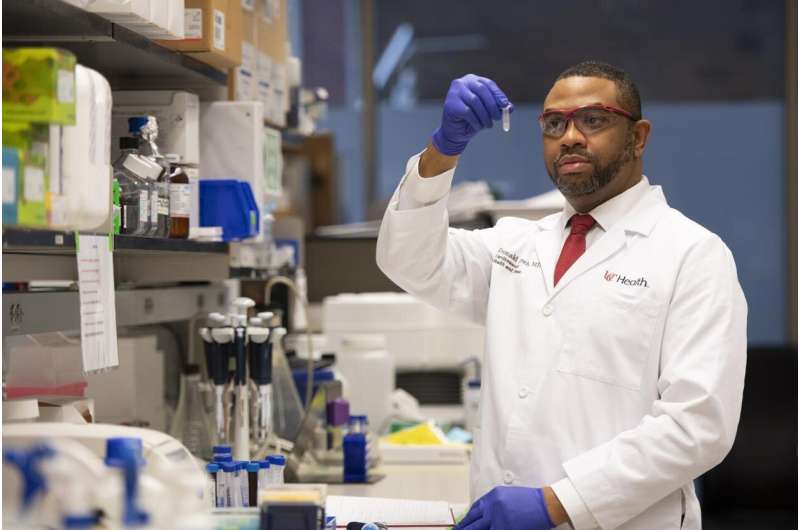
Laura Riesenberg was visiting a local amusement park with three of her children when she suffered a massive heart attack.
“I was down for about 20 minutes and they defibrillated me twice on site, possibly three times,” she says. “Obviously, I was unaware of it. I know from reading the reports what happened.”
“I was extremely fortunate that someone found me within seconds of collapsing,” says Riesenberg. “Had it happened anywhere else I wouldn’t be talking to you right now. If I had been in the basement doing laundry, I would have been in trouble.”
The 51-year-old Loveland, Ohio, resident was transported to UC Health’s West Chester Hospital where she learned she was a Type 2 diabetic and had suffered previous damage to the heart that led to a big blockage of her left coronary artery while at the amusement park. That type of blockage is often referred to as the “widow maker.”
Donald Lynch Jr., MD, assistant professor at the University of Cincinnati College of Medicine and UC Health cardiologist, says that the link between diabetes and heart disease often leads to adverse health outcomes for patients. Approximately 65% of deaths among patients with diabetes are due to cardiovascular disease.
Lynch, also Riesenberg’s current cardiologist, will be presenting preliminary research virtually at the American College of Cardiology on Saturday, May 15, that suggests plasma proteins discovered in the blood samples of diabetic patients who went on to develop obstructive coronary disease (OCAD) may serve as biomarkers of severe heart blockage. The findings might benefit patients like Riesenberg in the future.
Riesenberg says an internal defibrillator was implanted in her heart after her heart attack.
“There was no explanation why I survived the first heart attack or second heart attack. They also diagnosed me as diabetic that day. Mind you, I should have known. I had been a gestational diabetic, and I had been overweight, but I thought I was doing all the right things.”
“I had lost a significant amount of weight, and I was active. I was eating well or at least I thought I was eating well. I had absolutely no idea,” she adds. “I wish someone had been able to tell me that there was a strong link between diabetes and heart disease.”
Riesenberg, a homemaker, and her husband, Jay, are both diabetic and they worry if their medical hereditary history might someday impact their family; in addition to the three children who joined their mom at the park the couple have another seven.
As part of his research, Lynch, a researcher in the UC Division of Cardiovascular Health and Disease, looked at stored plasma samples from 70 diabetic patients: One group was found to have obstructive coronary disease while the second group did not. A total of 248 plasma proteins were identified; 15 were present in patients with obstructive coronary disease while only three were present in patients without OCAD.
“We took samples of plasma and used mass spectrometry to see if we could find biomarkers that were predictive of patients developing obstructive coronary disease,” says Lynch. “The significance of this is I see patients who have diabetes and unfortunately develop blockages but no symptoms.”
Lynch says Riesenberg was fortunate that she survived her heart attack and cardiac arrest. “For many patients that’s not the case,” he says. “We know patients with diabetes are much more likely to have blockages in the heart and unfortunately they are more likely to be asymptomatic which places them at significant risk. We don’t have good tools to figure out which patients will develop blockages.”
“What we found is that we can use a blood test and identify patients with diabetes who might develop obstructive coronary disease,” says Lynch. “It is a challenge to identify which patients with diabetes are at higher risk. This may be a good tool in our toolbox to help us in our fight against cardiovascular disease in patients with diabetes.”
“We can get them to a provider and have them assessed early for the possibility of developing obstructive coronary disease,” says Lynch.
The research is particularly important to Lynch, who disclosed he also battles diabetes. He has planned future studies to further evaluate the ability of these biomarkers to identify patients with coronary disease and improve cardiac outcomes for patients with diabetes.
The preliminary research has definitely captured the interest of Riesenberg, who spoke with Lynch about his findings.
Source: Read Full Article
